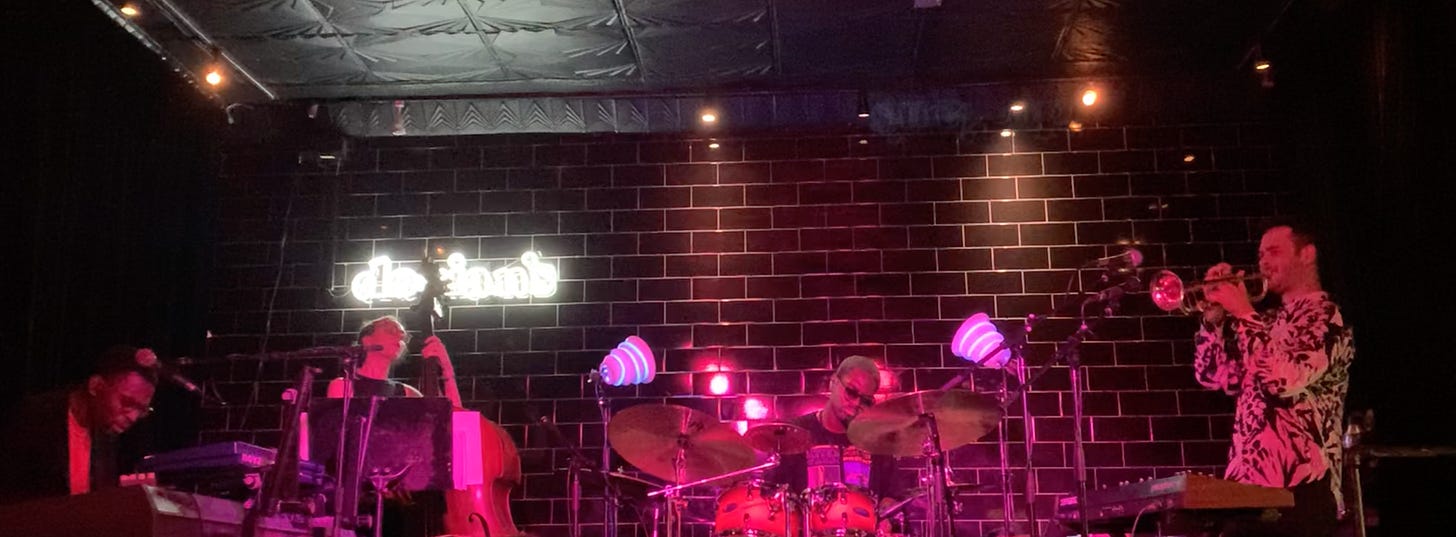The Fermata Weekly is the weekly recap & preview of my artistic activity, with special attention given to Notes of Rest, my contemplative-musical retreat, and The JuJu Exchange, my jazz-electronic fusion band.
Upcoming Appearances:

Hi everyone,
For those of you who were able to make The JuJu Exchange show at Dorian’s on Saturday, thank you for coming through and showing love. What a beautiful time we had together! Today I wanted to focus on the close of our second set. The trio of Nico Segal, Nova Zaii and I played How Great Is Our God and everybody started singing along. The “congregational” participation for instrumental worship song was so dope to see. (Coincidentally, this happened also at a show in DC in 2017 at a venue called Songbyrd.)
As a performer and Christian I am thankful for the phenomenon of people voluntarily singing about The Lord, and as an academic student of religion I am fascinated by these moments. This kind of spontaneous singing points to a unique feature of religious music in the post-Christendom West: music to God may find a more welcoming audience beyond the church than talk about God may in find in those same settings.
Originally recorded by Chris Tomlin and then famously covered by Chance the Rapper (which is probably how many in the crowd knew the song), the lyrics of this song make a clear case for the supremacy of the God of Israel described in the Bible: “How great is our God/sing with me how great is our God…name above all names/worthy of all praise…let all the earth rejoice.” Tomlin’s lyrics find resonance throughout the Psalms (e.g., 40:16, 147:5), so the arc of the song makes sense from that theological perspective. But what stands out to me is that this song about God’s supremacy is being sung by many of our band’s fans - Gen Z and millennials - who may not actually agree with that doctrine. I may be making a generalization and inference, but given the great number of millennials and Gen Z’ers who don’t identify with any religion, it’s safe to assume that in a secular setting like a show for The JuJu Exchange, a decent number may not be singing this song from the perspective of the Psalmists, who were encouraging exclusive fidelity to the God of ancient Israel. And beyond the stats, I have had conversations with some of our fans who love that we play that song yet hardly identify as religious, in part because they disapprove of the supremacist claims religions can make. So what to make of these moments?
The popularity of the song despite the decreasing popularity of the religious texts and communities behind the song signals the importance of music as a place worthy of investigation for religion in the modern US. For as much as fellow Christians and me mourn the loss of religious language and biblical literacy, there is still widespread belief in God that is expressed in various ways, not the least of which being through music. I want to start asking people about what they think of all of the exclusive claims made in a song like How Great. Do they even care? Or is it just a good song where the lyrics are inconsequential to the uplifting sentiment of the chords? Even if they do care about the theology, is God to be understood as the God of Israel? Or is “god” some nondescript divinity about whom we can sing without holding seriously any claims of exclusivity or superiority? I don’t know, I’m just floating thoughts out, but I am curious about that because music’s place is as central as ever, even if “organized religion” is increasingly marginal. What if music is functioning for many as the postlude to “organized religion”?
This observation suggests to me that music is a key arena for having conversation about theology. People may be fairly hostile or disinterested in talking about formal doctrine, but they may be far more inclined to sing about it. I want us to interrogate that. Why is that, and what does this process of singing these songs do to us? And perhaps more to the point, what kinds of conversations does music make uniquely possible?
What do you think? Do you sing lyrics of songs that you disagree with? If so, why? And what do you think about how the act of singing molds you and others?
As a millennial Christian who increasingly feels like a minority voice in non-religious spaces, it’s important for me to consider how music serves as the container for theological discussion now in ways that church once did more widely. Many people won’t darken a church door anymore, but as they pass it for brunch, they may hum a tune wafting out the windows from the choir loft. I’m interested in the prayer in that hum.
abundantly,
Julian




Very interesting.
I notice that I do not or cannot sing during times when I'm feeling really low emotionally. Whereas when I feel alive, joyful, I listen to music almost incessantly, and I sing loudly in the shower. The singing feels like something defiant and necessary, almost like a yell or a breath. I agree with you that music often ends up being fertile ground for spiritual & religious conversation & connection with my churched & unchurched peeps. This is good stuff, Julian.